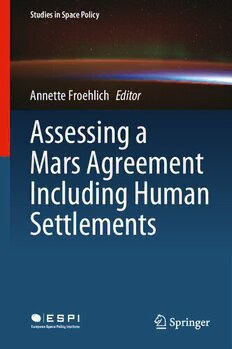
Assessing a Mars Agreement Including Human Settlements PDF
Preview Assessing a Mars Agreement Including Human Settlements
Studies in Space Policy Annette Froehlich Editor Assessing a Mars Agreement Including Human Settlements Studies in Space Policy Volume 30 SeriesEditor EuropeanSpacePolicyInstitute,Vienna,Austria Editedby:EuropeanSpacePolicyInstitute,Vienna,Austria Director:Jean-JacquesTortora EditorialAdvisoryBoard: MarekBanaszkiewicz KarelDobeš GenevieveFioraso StefaniaGiannini GerdGruppe MaxKowatsch SergioMarchisio FritzMerkle MargitMischkulnig DominiqueTilmans FritsvonMeijenfeldt https://espi.or.at/about-us/governing-bodies The use of outer space is of growing strategic and technological relevance. The development of robotic exploration to distant planets and bodies across the solar system, as well as pioneering human space exploration in earth orbit and of the moon, paved the way for ambitious long-term space exploration. Today, space exploration goes far beyond a merely technological endeavour, as its further development will have a tremendous social, cultural and economic impact. Space activities are entering an era in which contributions of the humanities — history, philosophy, anthropology —, the arts, and the social sciences — political science, economics, law — will become crucial for the future of space exploration. Space policythuswillgaininvisibilityandrelevance.TheseriesStudiesinSpacePolicy shallbecometheEuropeanreferencecompilationeditedbytheleadinginstitutein thefield,theEuropeanSpacePolicyInstitute.Itwillcontainbothmonographsand collectionsdealingwiththeirsubjectsinatransdisciplinaryway. Thevolumesoftheseriesaresingle-blindpeer-reviewed. Moreinformationaboutthisseriesathttp://www.springer.com/series/8167 Annette Froehlich Editor Assessing a Mars Agreement Including Human Settlements Editor AnnetteFroehlich EuropeanSpacePolicyInstitute Vienna,Austria ISSN1868-5307 ISSN1868-5315 (electronic) StudiesinSpacePolicy ISBN978-3-030-65012-4 ISBN978-3-030-65013-1 (eBook) https://doi.org/10.1007/978-3-030-65013-1 ©TheEditor(s)(ifapplicable)andTheAuthor(s),underexclusivelicensetoSpringerNature SwitzerlandAG2021 Thisworkissubjecttocopyright.AllrightsaresolelyandexclusivelylicensedbythePublisher,whether thewholeorpartofthematerialisconcerned,specificallytherightsoftranslation,reprinting,reuse ofillustrations,recitation,broadcasting,reproductiononmicrofilmsorinanyotherphysicalway,and transmissionorinformationstorageandretrieval,electronicadaptation,computersoftware,orbysimilar ordissimilarmethodologynowknownorhereafterdeveloped. Theuseofgeneraldescriptivenames,registerednames,trademarks,servicemarks,etc.inthispublication doesnotimply,evenintheabsenceofaspecificstatement,thatsuchnamesareexemptfromtherelevant protectivelawsandregulationsandthereforefreeforgeneraluse. Thepublisher,theauthorsandtheeditorsaresafetoassumethattheadviceandinformationinthisbook arebelievedtobetrueandaccurateatthedateofpublication.Neitherthepublishernortheauthorsor theeditorsgiveawarranty,expressedorimplied,withrespecttothematerialcontainedhereinorforany errorsoromissionsthatmayhavebeenmade.Thepublisherremainsneutralwithregardtojurisdictional claimsinpublishedmapsandinstitutionalaffiliations. ThisSpringerimprintispublishedbytheregisteredcompanySpringerNatureSwitzerlandAG Theregisteredcompanyaddressis:Gewerbestrasse11,6330Cham,Switzerland Preface Thepreviousworldwidespacelawessayinvitationonthetopicoftheprotectionof cultural heritage sites on the Moon was a great success and was well received by thespacecommunity.Accordingly,theEuropeanSpacePolicyInstitute(ESPI)and theGermanAerospaceCenter(DLR)launchedtheirfollow-upinvitationforarticles by students and young professionals on the topic of assessing a Mars agreement, includinghumansettlement.Excellentcontributionswerereceivedfromaroundthe world.Thisbookthusbringstogethernewandinnovativeideasandfreshperspectives onthistimelytopicthattakesplaceagainstthebackdropofincreasinglywidespread discussionsonrampinguphumanactivitiesontheredplanet. AccordingtotheEuropeanSpaceAgency(ESA),theseactivities,currentlyrobotic innature,buttobefollowedupbyahumanpresenceonMars,arefocusedprimarily onthesearchforlife,andgainingagreaterunderstandingofthegeology,hydrology, atmosphereandbroaderenvironmentalevolutionoftheplanet.Undoubtedly,witha humanpresenceonMars(eithertemporaryorpermanent),miningandotherkinds ofresourceextractionwillalsobecomeimportantactivities.Indeed,inrecenttimes variousinitiativesandtechniquesformanagingahumanjourneyandstayonMars have been discussed, and it is widely accepted that humans will leave their home planetinthecomingdecadestobecomeaninterplanetaryspeciesandtoundertake awiderangeofactivitiesinspace.Undoubtedly,theMoonwillbethefirsttargetof this expansion. For this reason, the previous worldwide space law essay invitation andresultingbookplaceditsfocusontheMoon. However, as humans ramp up their Martian endeavours, critical legal questions arisethereaswell.Indeed,oneofthecentralchallengesisthatthebasiclegalprin- ciples drafted and commonly accepted within the international community were framedbytheearlyspaceactivitiesofthesuperpowersandthustookintoaccountthe challengesandpreoccupationsofthattime.Therefore,eventhoughtheOuterSpace Treaty,oftencalledtheMagnaCartaofinternationalspacelaw,hasthescopetocover allspaceactivitiesinouterspaceandcelestialbodies,ithasalreadybeenarguedtobe insufficientinkeepingupwiththerapidpaceoftechnologicalprogress.Thesubse- quentMoonTreatyexpandedonsomeofthemainshortcomingsoftheOuterSpace Treaty,butdidnotreceive widespread acceptance, particularlybythemainspace- faringnations.Withgreaterattentionnowbeingdirectedtowardshumanactivities v vi Preface andsettlementonMars,theurgencyofaddressingoutstandinglegalquestionsina manneragreeabletoallstakeholdersisthusgrowing. Accordingly,thisbookpresentsacollectionofrichcontributionsfromthenext generationofspaceprofessionalsonthistopic,assessingvariousaspectsofpotential specialinternationalrulestobecompiledinafuturemulti-layeredMarsagreement. Theindividualchaptersconsidernotonlyaspectsofregulation—includingtheprece- dentoftheInternationalSpaceStationagreement,intellectualpropertyrights,legal considerations around the freedom of exploration and use, and the legal implica- tionsofcontactwithextraterrestrialintelligence—butalsoaddressthecreationand managementofanewsocietyonMars—includingwastestreams,criminaljustice, humanreproductionandchildbirth,andtheprotectionofhumanrightsinprivately fundedsettlements. Giventheurgentneedtoconsidertheseandotherinternationalspacelawissues beforeactualsettlementtakesplace,andthedearthofpublicationspresentingfresh perspectivesandideas,westandthebestchanceoffindingagreeablesolutionstothe multitude of challenges around Mars settlement and exploration by giving a voice toyoungprofessionalsfromaroundtheworld.Thispublicationthereforeprovides asolidcontributiontodebates thatwillshapethefutureofhumanity,andhelpsto ensure that this takes place in the spirit laid down by the Outer Space and other treaties—thattheexplorationanduseofMarsshallbecarriedoutforthebenefitand intheinterestsofallhumankind. October2020 Dr.AnnetteFroehlich EuropeanSpacePolicyInstitute(ESPI) SecondedbyGermanAerospaceCenter(DLR) Vienna,Austria Contents 1 AgreementsProtectingLivesonInterplanetaryEnterprises (ALIEN):TailoringaMarsCriminalJusticeSystem .............. 1 LaurynHallet 2 Is Human Settlement on Mars Marking the Beginning of a New Era of Intellectual Property Rights Protection inOuterSpace? ............................................... 15 TerezieNeˇmcová 3 OntheProvinceofAllMarskind ............................... 27 MariaLucas-Rhimbassen 4 HowFiveFundamentalHumanRightsCouldBeViolated in Privately-Funded Space Settlements and the Role oftheMarsAgreementinTheirProtection ...................... 37 JuanGarcíaBonilla 5 Legal Implications of Detection of or Contact withExtra-TerrestrialIntelligenceintheMarsAgreement IncludingHumanSettlements .................................. 51 TugrulCakir 6 TheInternationalSpaceStation(ISS)Intergovernmental AgreementasaPrecedentforRegulatingtheFirstHuman SettlementsonMars ........................................... 63 AlexandrosEleftheriosFarsaris 7 BuildingaNewLegalModelforSettlementsonMars ............. 75 IvanFino 8 FactorsInfluencingtheFutureMartianPopulation ............... 85 SatyamTiwari vii viii Contents 9 LegalImplicationsforGenderMixedHumanSettlements onMars—PreliminaryThoughtsonHumanReproduction andChildbirthinSpace ........................................ 99 ClaudiuMihaiTa˘iatu 10 Who Speaks for Mars? The Responsibility to Protect andtheSearchforLife ........................................ 113 AndréSiebrits 11 CrewedSpaceMissionWaste-StreamsandImpactonHuman ExplorationofMars ........................................... 129 SamuelAnih 12 Shared NetworkInfrastructures onMars:Implementing LegalToolsfortheEstablishmentandRegulationofaMartian PowerGrid ................................................... 147 RobertBente 13 ATaleofTwoPlanetsinInternationalSpaceLaw:Limitations totheFreedomofExplorationandUse .......................... 167 RadheySoundaryaGnanesh 14 Protecting the Million-Year Picnic: The Importance ofImportingtheRuleofLawtoMars ........................... 181 YukChiChan 15 FromAntarcticatoMars:DevelopingaMarsTreatySystem ...... 193 JohnTziouras Chapter 1 Agreements Protecting Lives on Interplanetary Enterprises (ALIEN): Tailoring a Mars Criminal Justice System LaurynHallet Abstract The colonisation of Mars has always seemed like a distant dream. However, with the increase of Mars exploration missions and concrete plans from states and private companies to send humans on the Red Planet, the dream may well become reality. The challenges will not merely be technical or scientific, but sociologicalandlegal.Takingintoaccountthoselasttwoelementswillbedecisive inmaintainingorderamongstMarssettlersandmanagingcriminalactivity.Tothis end, a new criminal justice system tailored to Mars has to be created. On the one hand,itshallbeinformedbyhowlivingonMarswillaffecthumanbehavioursand violence.Tothisend,thestudyofcertainchallengingenvironmentsandunderlying behaviouralpatternscanbederivedtoanticipatecriminalactivityonMars.Onthe other hand, questions of jurisdiction to investigate and prosecute those crimes, as wellasdelegatingauthorityhavetobeansweredandlegallyframedpre-emptively toinhabitingtheplanet.However,noexistingsystemisapttoregulateMarsasis. Instead, several cases can be used to build a base for reflection on what elements workandmaybereproduced,andwhatisineffectiveandshouldbediscarded. 1.1 Introduction WhenonethinksaboutthecolonisationofMars,theymaypicturevastdesertedred landswithfuturisticdomesinhabitedbyselectedfewhumans.Anewlandharbouring unlimitedpossibilities.Theultimatebreakofthelastfrontierandachance forthe humanracetostartover.ButifhumansaretopopulateMarswiththeirknowledge, dreams and good intentions, an uninvited guest may come along; crimes. It has beenassertedthatcriminalactivityonMarssettlementsispracticallyimpossiblein reason of the status of astronauts.1 The idea that persons of such pedigree would beimpermeabletoviolencebecauseoftheirintrinsicrespectfordisciplineandthe 1ChristopherJ.Newman,‘Exploringtheproblemsofcriminaljusticeinspace’(2016)2(8)ROOM. B L.Hallet( ) UniversityofBristol,Bristol,UK e-mail:[email protected] ©TheAuthor(s),underexclusivelicensetoSpringerNatureSwitzerlandAG2021 1 A.Froehlich(ed.),AssessingaMarsAgreementIncludingHumanSettlements,Studies inSpacePolicy30,https://doi.org/10.1007/978-3-030-65013-1_1
